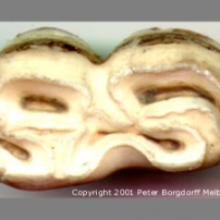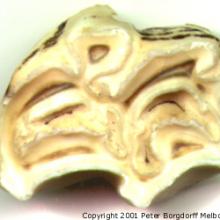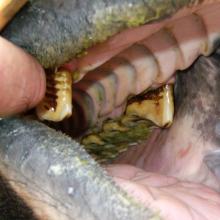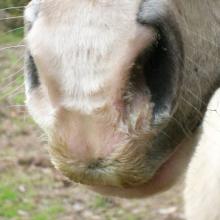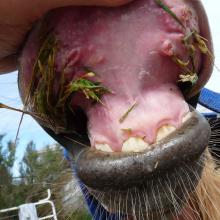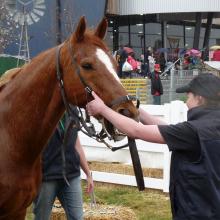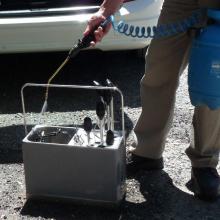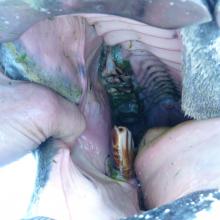
CAREER CHOICE: EQUINE DENTISTRYTraining with the Australian Equine Dental Practice has been a stepping stone to a career for many. What the horse experiences during treatment is most important and treatment methods associated with this make the training widely respected. We teach equine dentistry trainees a caring approach that uses effective and measured methods which respect the natural structure of equine dentition with the aim of restoring dental conformation over a period of time. No other persons are accredited by AEDP founder Peter Borgdorff to teach these methods. The word 'academy' or 'school' is not used, because the AEDP course is a private Course. The AEDP standard of education is unlike any government accredited Diploma-level training as it is fully developed within the equine industry and not by bureaucrats. The qualification enables successful trainees to practice as Diploma qualified equine dental practitioners in the field of equine dentistry. The course is typically 25 weeks in duration for non-veterinarians. Additionally, valuable practice support is offered for twelve months after successful completion of the course.
COURSE MODELThe AEDP Diploma qualification provides for a comprehensive equine dentistry related theory subject base in conjunction with extensive practical competencies. The Course currently offered by the Australian Equine Dental Practice has been developed by an experienced equine dental practitioner acutely aware of what course content is required to provide the best equine dental care model. From evolutionary anatomy and disease processes to treatment planning and nutritional advice, the intensive equine dentistry course goes well beyond that of other courses or traineeships currently offered by other organisations or institutions. The key is the process by which broad, yet in-depth knowledge leads to a sound diagnostic and treatment approach which respects natural dental function. Whether you are a Veterinary Surgeon and would like to do a postgraduate course or you are an experienced horse professional who wants to train in the field, contact us and we can provide you with more information. EQUINE DENTISTRY COURSE DELIVERYThe Diploma of Equine Dentistry Course has the following format:
COURSE DATES AND PARTICIPATIONAll Courses are open to residents of any country as the theory element is provided as distance education. Most foreign trainees can be offered practical training in a single period instead of two separate periods. There are two Courses starting in 2025 with the number of participants currently limited to 4 people. This allows good practical instruction with good quality face-to-face tuition. There is personal theory and practical evaluation during the entire Course. For those that are suitable applicants who may need some assistance with payments, please enquire as you may be able to spread part of your payments during your course participation. HECS loans are not available as this is a private course.
ENQUIRIESPlease make initial enquires to Peter Borgdorff via email to peter@equinedentalpractice.com or by calling 0414 566 789 (Int +61 414 566 789). Before you proceed with an enquiry or application, you may like to give some thought to:
OUR APPROACH TO EQUINE DENTISTRYThere are a number of issues to consider when deciding on how to learn skills required to practice equine dentistry. Equine dentistry may be a suitable career for caring, fastidious and reputable people. The industry needs those who base their career on methods that are sound and proven by the test of time. Different courses teach different methods. Some are scientifically based, some are not. Equine dental treatment must be carried out correctly. It must avoid the use of poor equipment and aggressive treatment with basic power tools. Owners of horses should be aware of the hazards of removing substantial amounts of dental material and even more so when these tools (crude grinders) are applied without continuous water cooling.
FOOTNOTESince 2006 Peter Borgdorff applied substantial effort to the preparation of the national accreditation of the Certificate IV as well as the Diploma of Equine Dentistry. He was a member of the National Reference Group (Agrifoods) on behalf of the National Equine Dental Practitioners Inc. (NEDP) and the AEDP. The National Accreditation planning towards the Diploma of Equine Dentistry qualification was terminated as it was opposed by the Equine Dental Association of Australia (EDAA) and the Australian Veterinary Association (AVA- Equine Veterinarians). Both parties had vested interests in not formalising the status of Equine Dentistry at that level. The AEDP decided to provide the planned higher-level Diploma training as a private course. Properly informed veterinarians strongly support the work of the National Equine Dental Practitioners Association (NEDP members and our ethics. They work with us regularly and do not engage in anti-competitive behaviour but instead are committed to team work for the benefit of your horse. |

